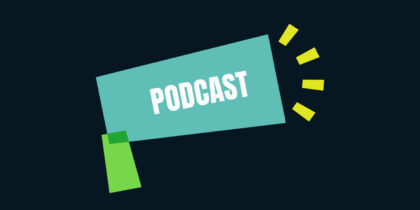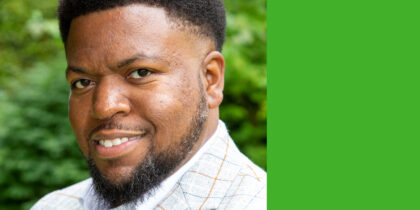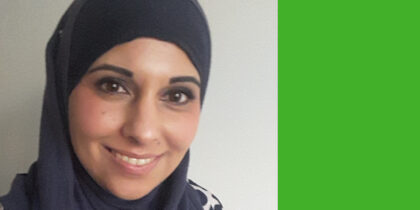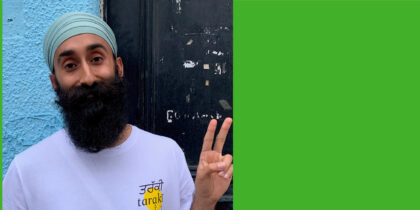Author and campaigner Hope Virgo joins Thea Joshi to discuss her experience of anorexia, her campaigning around BMI and menu calorie labelling, and how she is navigating pregnancy while in recovery from an eating disorder. They also discuss the challenges and frustrations that come with campaigning, and what Hope does to maintain her own wellbeing.
Listen to the episode on Spotify or Apple Podcasts. The full transcript is available below.
Show notes
- Follow Hope on Instagram
- Check out the ‘Dump the Scales’ campaign
- Read the open letter sharing concerns about calorie labelling on menus and the original letter by Hope when the measures were proposed
- This briefing by Nick O’Shea includes a discussion about how rationing mental health services pushes people towards higher-intensity (and more expensive) crisis services
- Listen to our podcast with Poppy Jaman OBE which includes discussion of self-care
- If you need more support, check out our list of helplines or visit Beat for support around eating disorders
Music by scottholmesmusic.com
Transcript
Alethea Joshi (AJ): Hello and welcome to Centre for Mental Health’s podcast, where we explore ideas around mental health, equality and social justice. I’m Thea Joshi and this month I chatted to Hope Virgo who’s an author and campaigner, particularly around eating disorders. I heard about her own experience of anorexia and working towards recovery, and the work she’s been doing as a campaigner to improve access to effective eating disorder support. We discussed the frustrations that can come with campaigning, managing an eating disorder whilst being pregnant, and also what Hope does herself to manage her own wellbeing. So today, I’m joined by Hope Virgo. Hi, Hope.
Hope Virgo (HV): Hi, thanks for having me.
AJ: Oh, it’s so good to have you on the podcast. So I think we’ve worked together for quite a few years now. You’ve done a lot to support us at the Centre. And we’ve been really excited to see your campaigning journey grow. So I’m really excited to have you on the podcast today, to hear more about your story and the work that you’re doing around eating disorders. So I’m gonna dive right in, I’d love to hear a little bit more about your own story.
HV: Yeah, no definitely. So I developed an eating disorder when I was about 12, 13. I didn’t know at the time I had an eating disorder. But looking back, I think there were multiple things that probably caused that to start. So I, when I was growing up, I found it really difficult to express my emotions and really struggled with kind of feeling things. We do know also with eating disorders, there’s more and more research coming out looking at the genetic aspect of eating disorders. And then as well, I was also sexually abused when I was 12 years old. And for me, it was like a combination of all of these moving parts that caused me to try and find other ways to cope. And a really big thing for me was going through some form of abuse, meant that I was kind of sitting with these feelings, that there was something kind of categorically wrong with who I was. And it was that part of me that I wanted to change. So I didn’t talk to anyone about it as you do as a child, and probably as an adult as well, when you’re quite embarrassed and quite ashamed of what you’re feeling, and ended up looking kind of for other routes to go down. And that was when I started restricting, and kind of obsessively exercising. And what I gradually began to realise over the next couple of months was the more I did those behaviours, the better I was feeling about life, and it kind of offered that distraction, it numbed all the emotions, and it really just kind of took me out of the reality of growing up and helped to just give me like a different sense of purpose and value within everything I was doing. Obviously, at the time, I didn’t really realise what I was doing was really, really dangerous.
So I just kept doing these behaviours kind of time and time again, my brain chemistry got completely changed. And I was kind of stuck in this place with this eating disorder without really understanding it. Eventually, after kind of four years of hiding it from everyone around me, my school did intervene. And at that point, my mum took me to the doctor, and then I was referred to CAMHS. I spent about six months there. But like a lot of people with eating disorders, it’s really, really hard to accept that anything’s no matter, particularly when that behaviour is giving you something that you feel like you need. And it becomes so ingrained. And I do think as well nowadays, because a lot of people have quite a dysfunctional relationship with food and exercise, you then just think what you’re doing is normal, and what you’re doing is fine. So then you keep going back to that behaviour, kind of as that coping mechanism time and time again. So yeah, I spent six months as an outpatient, but nothing was really working. And eventually was admitted to a mental health hospital and spent about a year living there, learning a lot about food, exercise. But I think the biggest thing for me apart from, obviously, like feeding myself, going through a feeding programme as well, was having space to talk about what was going on and to understand how to communicate and to understand the eating disorder and what it was doing for me in that moment.
And then pretty much ever since then, I’ve been in an ongoing state of recovery. Physically, my body’s obviously healthy now and things like that. But with eating disorders, even though someone looks okay on the outside, and maybe is eating, it doesn’t mean that things are fixed. So I have a had a lot of work to still do kind of mentally to kind of challenge behaviours, and to again, keep communicating when things feel really hard.
AJ: Wow, thanks so much for sharing that with us. And you speak really powerfully about yeah, why you ended up kind of taking on those behaviours and what what they were trying to achieve for you, I guess. And I sort of think looking back now to your sort of 14, 15, 16 year old self, what do you think you needed at that time? What do you think would have helped? Did you did you get the help you needed?
HV: So I’m only 32. But when I was growing up, I don’t think people really talked about eating disorders at all and no one really understood them. And whilst I think it’s an illness that still massively stigmatised today, obviously the stigma when I was growing up was much, much higher as well, particularly with the lack of understanding, the lack of education around it. And I think people didn’t know how to approach it a lot of the time. And when they did approach it with me, I was very kind of just not wanting to engage in it. I remember the odd time that my mom would try and talk to me about my eating habits, I just got really, really frustrated and was like, ‘No, I’m fine, you don’t understand, like, this is what everyone does’, kind of thing. But I do think that if someone had gotten there, kind of when I was maybe 13, before my brain chemistry had started to change, and before I’d been going through, like such a long period of kind of starvation, I think I potentially would have just wanted someone to be like, what’s going on? Like are you okay, how are you feeling?
We know that eating disorders aren’t really about the food, they’re not about the exercise. They’re not about body image, they’re because something’s going on for that person. And I think so often, we lose sight of that and forget that it’s a mental health issue. And so yeah, for me, I think that would have been really, really useful. And then again, getting in there early, and just having that kind of professional support. And that intervention at an earlier point, I think, would have given probably given me a better chance of having a quicker chance of recovery as well.
AJ: Yeah thanks. That’s really helpful insight. So obviously, you know, now you’re really well known as a mental health campaigner campaigning around eating disorders, lots of other things. Could you just talk us through sort of the last few years, what you’ve been doing as campaigner?
HV: Yeah, so I think I’ve been campaigning, I was thinking about this earlier actually, probably like four or five years now, which seems like such a long time. And when I started doing it, I definitely didn’t think I’d still be doing it right now. I actually probably thought naively, I would have kind of finished doing what I was doing with it, made some change, and then kind of moved on to something else. But obviously, stuff takes a lot longer than that, as well to kind of challenge the system as well.
And so yeah, basically kind of split my time between doing a lot of work in schools. So particularly with kind of young people, but also carers as well, getting them to understand about eating disorders, exercise addiction, disordered eating, and then like getting them to work out how they can support themselves, how they can support others. And also, just to try and normalise some of these conversations around eating disorders, I mentioned a moment ago about the stigma with eating disorders. And it’s definitely something that we see on a day to day basis, kind of that people do think it’s a choice, someone being difficult, like something that only affects white, teenage underweight girls. And for me, a huge part of my message is around realising that actually eating disorders can be just hidden completely in plain sight. And so much of the time, we have no idea when someone’s struggling, and it’s those people who then again, find it harder to access services and support. So need that kind of, yeah, awareness around that to then challenge that and change it.
And then yeah, alongside that, I’ve got a campaign called Dump The Scales, which is all around scrapping BMI when it comes to diagnosis. But also, at the moment, doing a lot of work with that around funding. And trying to do some stuff on education, trying to kind of tackle issues around the workforce. And then kind of most recently, off the back of that campaigning work, doing a lot of work to push back on the recent calorie legislation. And I think the frustrating thing, if I’m honest, is that we know there’s a huge issue with eating disorders. And when you’re kind of working on the ground, you see it on a day to day basis. And I think like my inbox, probably like other campaigners or people who work in this space, it’s inundated daily with just hundreds of messages from people who can’t get support or treatment and who really want to get well but just don’t know what to do about it. And I just don’t understand why we’re not tackling stuff like eating disorders as a matter of urgency. And we’re just not putting the money into them, actually, that we really, really need. So a lot of stuff at the moment is just around trying to shift that so that people do see this as something that needs to be tackled, because I honestly just don’t think in 2022 people should be dying of eating disorders when we know it’s a treatable and preventable illness.
AJ: I mean, I couldn’t agree with you more. And I mean, there’s so much that I want to ask you about and talk about. I think it’s really interesting, the frustration that you are expressing around kind of how long it takes things to change. And obviously we’re working as an organisation rather than as an individual. and so the challenges are different, but I think we can definitely testify to that frustration, that sometimes you feel like you’re saying, literally, ‘here are the things we need to do. Why aren’t we doing them?’ Why are we essentially just allowing people to suffer from what are treatable and preventable conditions to a greater or lesser degree? I’m not saying we’re going to get rid of mental illness, but there are definitely things we can be doing and we’re not always seeing them being done, and not at the pace of change that we want, right? Especially as you say, when you’re seeing people for whom this is a daily current reality. There’s so much I could ask you about. But just quickly, you mentioned Dump The Scales and campaigning to get rid of BMI. Can you just talk us through really quickly what that looks like and just a bit more about that campaign?
HV: Yeah, definitely. So I guess as background to it, So I in 2015/2016, I relapsed with my eating disorder. It was following a bereavement in my family and I was really, really struggling to process that, and kind of process what had happened. And I struggled probably for, I want to say only about four months, which felt like a really long time for me, and was kind of so stuck in my head, I didn’t really know what to do about it. Eventually, my mum, like really boldly kind of came up to London and was like, ‘What is going on? What are you doing? You need to sort this out.’ And so I ended up referring myself to services and went to an appointment and obviously wasn’t underweight. So there was nothing that they could offer me at that service. And I left that appointment and just felt just so fed up with the whole system, I felt like I’d been completely kind of misunderstood, I felt like people only would kind of take me seriously if I looked a certain way. And luckily, for me, I had had a lot of treatment in the past. And so kind of used a lot of the coping mechanisms that I learned when I was in hospital, just like 7, 8 years before that. And then also, I do have a good support network around me. So like friends and family really kind of got together and were like, right, how can we get through this, like, what are we going to do? And like really practical support as well, just around like texting around mealtimes kind of checking in with me, all of that sort of stuff. So I’ve managed to kind of pull it back quite quickly over the next year.
But then when I started speaking up about what I’d been through, I just began to realise that this isn’t something that just happens to me. But there is just so many people every single day, who just cannot get the support or treatment because they’re not underweight. And obviously, this isn’t something that just affects people with anorexia, it’s every single type of eating disorder, you just can’t get that support. And it’s just a complete injustice. And so I launched the campaign, I guess, from a societal point of view, I wanted society to understand that someone can look okay and still have an eating disorder. And that just because someone’s eating, it doesn’t mean that they’re totally fixed. And then from a government and NHS standpoint, I really wanted to make sure that we had the right funding going into services so that we could completely scrap BMI, and stop judging the severity of an eating disorder based on BMI. And I think it’s really hard because we’ve I’ve had like a lot of conversations over the last couple of years around what we could put in place instead of BMI. And obviously, in some cases, you have to weigh someone with an eating disorder. But doing it based on BMI just doesn’t work. And it’s so invalidating for that individual.
And I think the other frustration is there was a lot of progress being made prior to the pandemic. And then obviously, the pandemic happened, and then eating disorder cases kind of escalated. And then because of the lack of funding and the lack of services, it’s like, actually, we have to have a cut off point. So what was supposed to be something that we could scrap all together with BMI, particularly in the NICE guidance, is now something that actually unless we invest into services, we just can’t scrap it.
AJ: Thank you for sharing that. And yeah, it’s so incredibly frustrating and worrying, concerning, all of the other words, just to hear what’s going on. And this is the reality that we’re still facing in 2022. I think it’s interesting as well, because obviously, we’re talking very specifically about eating disorders and eating disorder services. But also, this just feels like a message that we’re hearing again and again, that people with lots of different mental health needs are presenting to services, are coming to services, seeking help and being told you’re not ill enough, or in some situations, you’re too ill. And I think I don’t know about you, but certainly for me, I think it’s one of the hardest parts of the job, and also the most motivating, hearing from people who are going through this and saying, you know, the service is not working for me, this mental health system is not working for me. Yeah, until everyone gets the help they need, we can’t stop campaigning, essentially.
HV: Yeah, no, it’s true. And I think you’re right, it isn’t just eating disorders that are affected as well. It’s so many people. And I think that what we’ve seen in the pandemic definitely is, you do have many more people with eating disorders, like you said, kind of being turned away for being not ill enough or being too sick. And that’s the kind of disconnect and it’s just it feels really messy out there at the moment. The amount of people with eating disorders ending up on general hospitals, kind of being tube-fed, and then it’s like there’s no psychological or no psychiatric support available for them. So what are they going to do, just get discharged in six weeks and then they’re gonna kind of be on this revolving door of kind of like, I’m in and our services because no one’s actually tackling the root issue.
AJ: Yeah, it’s incredibly harrowing to think that that’s the reality for people right now, I think. It doesn’t take a lot to realise that that’s not an effective way to be running services. And arguably, I mean it’s definitely not a humane way to be treating citizens in our country. So I know you hear from people, as you said earlier on, for whom this is a daily reality, and I’m just kind of interested to know, like, what have you been hearing recently? Has the picture changed sort of, during and after the pandemic? Or you know, where we’re at now? Yeah, what are you hearing from people?
HV: Yeah, there’s, there’s a real desperation out there, actually, from carers of people who were struggling, but also from individuals themselves, who are just so desperate to get well, and just don’t know how to or don’t even know where to start. People who are on yeah, just so many waiting lists, like, contacting their MPs, contacting kind of CQCs, just to try and get some sort of support. And I think it’s really difficult because there’s no support on the NHS. So then people are having to kind of find money to pay to go private. And then again, like a lot of the time with private treatment, whilst some of its really good, we also know that some of it doesn’t publish their outcomes. So again, it’s like actually, there’s kind of taking a little bit of risk spending all that money, when they’re not even sure it’s going to work. And it’s really, really sad. I think we know that more people are struggling at the moment. And whilst this was obviously a huge issue before the pandemic, and the services weren’t functioning properly, or couldn’t meet the demand, now, what was a really overstretched system, it’s just one that, for people with eating disorders, is just completely broken.
And the other thing, I think that’s quite scary, but also quite interesting as well is, because of the rise, we’ve also seen a lot more people in the workforce who are obviously burning out, who are really struggling, who are getting frustrated by the kind of lack of funding, the constraints in the NHS, so a lot of them are then going private. And then again, we’ve got kind of gaping holes within the NHS, for supporting people with eating disorders, particularly in that kind of psychiatric support space as well. So I think a lot of staff are also finding it really, really difficult to navigate and feeling really guilty. And I think I was also thinking about this recently, we often talk about issues around lack of understanding on the frontline, and particularly kind of with GPS and in A&E departments. And whilst we know that’s a huge issue, I don’t always think it’s right that we fixate just on that, because actually, we know that, yes, there’s a lack of understanding, but there’s nowhere for them to send people to. So it’s not actually often their fault that they’re turning people away from services. And I think too often we get fixated on that without actually embracing the wider kind of systemic problems that we’re seeing.
AJ: 100%. And it’s something that we at the Centre have been campaigning for a lot is around this workforce piece. And we know that I think it was the Long Term Plan was meant to kind of be addressing this. But I think what we’re seeing so far is that we’re simply not recruiting enough people into the mental health workforce to really meet the demand. I think that was, my understanding is that that was the case pre-pandemic. And now obviously, as we were forecasting, we are seeing a big rise in people needing mental health support directly as a result. And so as you say, there just aren’t the people to meet their needs, which is, again, really distressing. It’s definitely something that makes me angry, this idea that people are seeking help and being told ‘you’re too ill’ or ‘you’re not ill enough’ or ‘sure, we can help you in a year’. And that people who are really ill and their carers who are having to look after them are then having to do so much research to try and see ‘where on earth can I get help?’ You know, people who are feeling at their worst at that point, are then having to scour the internet to see like, ‘Where can I actually get some help?’ And it just feels like, yeah, the system just isn’t working.
But I wanted to talk specifically about something you mentioned earlier, which was the campaigning around calorie labelling on menus in restaurants. So obviously that legislation came in at the beginning of April, and you’ve been talking quite a lot about that. We published your open letter on it. Could you just tell us a little bit more about that and the conversation around that?
HV: Yes. So the Government last summer actually now, they published their obesity strategy. And within that they talked about how they wanted to put calories on menus as a way to tackle obesity, they thought it was going to do. But also to try and make people make kind of healthier informed choices. So I originally kind of pushed back on it last year actually, and had a number of meetings with various MPs, with Public Health England at the time, to kind of share my concerns, but rather frustratingly there wasn’t any budging from that end around it. So then, obviously, then it was published, and came into force on the 6th April this year. And I honestly think it’s just such a dangerous policy, I think, firstly, what they want to do with it, and are claiming that it will kind of help people inform more healthier lifestyle choices, we just know, that’s not going to work, we know that you can’t tell the health of a products based on how many calories are in it, because they’re completely different aspects of it. It will also induce huge amounts of fear and anxiety when people go out for dinner, whether you’ve got an eating disorder or not, it’s likely that conversations will kind of start to happen around calories, people will pick the lowest calorie option, or they’ll maybe compensate throughout the day, so they can have that option that they want to have, as well. And then obviously, for people affected by eating disorders, we know that going into a menu where there is calories labelled everywhere, just isn’t going to be a safe space for them. And then beyond that, obviously, 25% of people who start calorie counting will develop an eating disorder. So the collateral damage and fallout of a lead piece of legislation like this, is going to be absolutely huge. And within that, like I said, not doing what they want to do as well.
So recently, I have been calling on the Government to bring forward the evaluation. So they do the evaluation within five years. But I’m pushing for it to happen in the next 18 months, just because I think obviously we’re going to see the fallout in the next 18 months. So we might as well get on there and just evaluate it and then we can get it scrapped. I’m also making sure that all menus have a no calorie menu option as well. Which again, we’re encouraging people to go to restaurants and say actually, can I not have calories written on my menu? Can I have a calorie free menu? However they want to phrase it. And although that’ll be really good for people affected by eating disorders, it will also make restaurants actually start to realise, actually, our clients don’t want this. Like they want to have a space where they feel safe to come and eat.
And then finally, the other big ask is to just scrap calorie counts on children’s menus all together. I was literally appalled the other weekend when I took my nephew out. And we went to a cafe down the road. It was a chain, but it had calories plastered all over the kids menus, and we just wanted a piece of cake. And you’re just like, that is not okay. And it just really makes you think. I walked into another cafe recently. And it was like, ‘adults need X amount of calories every single day’. And I’m like, actually, that’s not accurate. Like, adults need a different amount of calories every day. Like we’re not all the same. The whole thing is just ridiculous. And I still can’t get my head round where they got the research from and who they spoke to, to actually develop this. So yeah, kind of constantly pushing back at that at the moment. And I think again, within that it’s really sad, like, I talk often about this kind of normalisation of eating disorder culture. And this, for me is just another step forward in normalising this kind of completely disordered relationship with food.
AJ: Yeah, I totally agree with you. And it’s really interesting, I’ve never struggled with an eating disorder. But it was very interesting for me to go into restaurants and suddenly see, yeah, all of these calories popping up. And there’s been some really interesting conversations out there going on, and I know you’ve been having a lot of them around sort of, you know, why are we doing this? Because the evidence from I think it’s the US where they’ve had this in place before is that, for people who don’t have eating disorders, it doesn’t seem to actually be very effective. People still go on to choose what they want to have, whether or not it’s a it’s a high amount of calories. And I’ve observed that behaviour in myself, seeing calorie counts and thinking, well, but I want this one. So the research out there suggests that it’s both completely ineffective for what it’s meant to be doing, and obviously, like, as we are seeing already, all over the place, anecdotally, very, very difficult for anyone who has any kind of disordered relationship with eating. It just feels like a really, really flawed attempt to solve a problem. It’s not even achieving the behaviour change it wants to see. And as well it’s being super damaging to the population.
And as you say, it’s it seems like a really bizarre way of encouraging people to, in theory, be healthier with their food, because instead of actually encouraging people to have a healthy relationship with food, it’s literally encouraging the opposite. So it seems flawed on so many levels, and I’ll definitely link, as you say you wrote a blog for us last year, calling this into question, which I’ll link to, and obviously the the open letter that we published a few weeks’ back. But thank you for sharing that with us. So I also wanted to talk briefly about, obviously, for people who follow you on social media, they will know that you are pregnant at the moment. Very exciting! And obviously, that comes with all its own joys and challenges for anyone. And I know you’ve been speaking about how that’s going for you as someone in recovery from an eating disorder. And yeah, I just wondered if you wanted to tell us a little bit more about that and how you’ve found it?
HV: Yeah, no definitely. Um, I guess, firstly, it was completely unexpected. So I wasn’t planning to get pregnant this quickly after getting married. And yeah, it was kind of in the life plan for probably like, two, three years time. But these things happen. And I think, yeah, I think for me, it was also really unexpected, because I knew from my past that there were huge issues around fertility. And when you’ve had an eating disorder, sometimes your hormones are kind of all over the shop anyway. So it’s, it can be really, really difficult for some people. And so in that sense, even though it was unexpected, I was also really grateful and kind of relieved that I could have child.
But it was terrifying. I remember, I found out probably like week eight or nine or something ridiculous. And yeah, was just so shocked. And I was just like, how is this possible, I didn’t know what I’m going to do. I was just so scared about what it was going to look like. And a lot of that I think was due to kind of all the emotions I was feeling, I had a lot of fear around it. But I also was like, how can I look after a child and have a child growing in me when I’m just not always great at looking after myself? And then within that, even though my eating disorder is not about kind of body image or anything like that, actually, like watching your body change on a kind of day to day basis is actually really hard. And I sometimes feel like that sounds like such a ridiculous thing to say. But I just yeah, I kind of used to lie awake in the evenings and just be like, so conscious that I was getting a bump. And at points would kind of quite like the fact that I was managing to grow something inside of me. But then at the same time, you then look at yourself in the mirror, and you’re like, wow, that is just not what I look like, how do I look like that? And I think particularly now, 35 weeks pregnant and just really tired a lot of the time, which just doesn’t work for me as someone who’s not only recovering from an eating disorder, but just someone who does what I do for a living, like, I don’t like not having energy. So yeah, I think for me looking back over the last 35 weeks, well, obviously, less than 35 weeks, I didn’t know the whole time, but the challenges have been quite huge.
So I went to my midwife, and my first appointment, and although they kind of flagged the pregnancy as a risk because of having an eating disorder, they still have to talk through the do’s and don’ts with what you eat, they have to talk about like, oh, you’ve got to put on this amount of weight, but you can’t… like unintentionally, it does feel a little bit like they’re enforcing some of those beliefs. So you’re kind of then sitting with these things like, am I not eating this because I can’t eat it because it will hurt the baby? Or am I not eating it because of the eating disorder? And honestly, for a few months, I was like having to question that in myself quite a bit and be like, am I doing this for the right reasons? Or am I just doing it as an excuse? And then obviously, when you are pregnant, you also get weighed quite a bit more. And for me, I had to get weighed on like a two week basis, because I’m under a consultant-led appointment, which is something that I’m just not used to as well. So kind of going into that environment where you know you’re being judged on your weight. And it’s, it’s really hard because you know your weight’s gonna go up. But at the same time, it doesn’t mean that mentally you’re okay. So trying to then really communicate what’s going on is really, really challenging in places because you’re like, I know that I look fine, and I’m pregnant, but actually, there’s still all of this other stuff that I’m trying to navigate.
But that said, I think I do feel like I’ve been really lucky with some of the support. So originally, I wasn’t able to access the mental health support, because I wasn’t underweight, which I at the time was it was so frustrating again, and I was kind of like, this is ridiculous. Like I’m obviously not underweight because I’ve got a baby growing in me. But then I kind of in my second trimester, they then said actually, we’re going to re-refer you back to the perinatal mental health team. So now I do get kind of a weekly therapy session and get kind of a lot more checks obviously from a consultant which is really, really helpful and it helps a lot with kind of processing things, a lot of the fear aspect. But it’s scary and I think one of the scariest things is, to sound really negative, we know that relapse rates for people with eating disorders when they’re pregnant and in the aftermath is in like, I think it’s around 67%, which is just so so high. And so I think for me, I know that I won’t ever get unwell again. But there is this kind of undertone of fear, and particularly for my family and husband as well. Like, actually, how am I going to cope afterwards? At the moment, it feels arguably easier because I have a baby that I need to kind of keep eating for, but actually afterwards, when there is a lot of uncertainty, when there’s so much emotion around actually what’s going to happen…
AJ: Yeah. Well, thank you so much for sharing that with us. Like, I know, obviously, it’s very current and very personal. And it’s lovely to hear, like, it’s really encouraging in lots of ways. But obviously, I think you summed up really clearly there the challenges and the things that make it so much harder when you’re also living with an eating disorder. And it’s encouraging to hear that you’ve been able to get mental health support, I guess, that points to some very welcome changes and investment in perinatal mental health support, although we know there’s still a long way to go for making sure that people don’t fall through those gaps. But yeah, that’s really encouraging.
HV: I think it is, I am really grateful, and I’m gonna sound really ungrateful now. But I am very grateful for the support I’ve got, but I do sometimes think, I guess, firstly, like, a lot of people don’t get that support when they’re pregnant. But also, I think what I struggle with is if I’d had, honestly, if I’d had proper treatment, kind of back in the day, I probably wouldn’t need the support now. And I think that’s what’s really frustrating is you’re kind of like, actually, why, why now am I able to access this when actually I probably could have done with this six years ago, but wasn’t able to then? So I think that’s my biggest contention at the moment is like, it just seems really, really, like really unfair, in some respects.
AJ: Of course, and it’s something we’ve covered at the Centre so, so so so many times, and we covered it in some recent work by Nick O’Shea that I’ll link to, that we are stuck in a system which is all funnelled towards the most kind of critical crisis point. And obviously, we need crisis care, like crisis care is absolutely vital. But we’re putting all our resources in there, and everyone is getting kind of funnelled to that place, rather than being supported earlier on, which would both save, in many cases, years of suffering for people, and also would cost a lot less. And it’s kind of like, there needs to be a complete rethink of how we deliver and how we fund services. Because yeah, as you say, it just makes no sense. Essentially, if we gave people the help they needed when they needed it, rather than in some cases, you know, 10 years down the line, we wouldn’t be seeing this come through. And that’s really tragic.
HV: It’s just frustrating, I think, yeah, just the lack of understanding and focus on prevention that could save yeah, millions of pounds, but also so many lives.
AJ: Exactly, exactly. It’s been really lovely to talk to you. And what I wanted to end on is, you know, we’ve talked quite a lot about, there’s obviously a lot of joys in campaigning and doing something that you completely believe in and, and using that anger to fuel change. But also, it obviously comes with a lot of challenges, you know, hearing a lot of stories where people are really struggling. And, you know, obviously, as you say, like managing your own mental health. And I just wondered if you wanted to share kind of what you do to help your own wellbeing and to help yourself keep well?
HV: Yeah, good question. And I still don’t think I’ve got it 100% sorted yet.
AJ: I don’t think any of us have!
HV: So yeah, when I first started campaigning, I definitely thought I didn’t need to do all the additional stuff, if I’m honest. And yeah, just kind of focused and fixated a lot on my campaigning and a lot of kind of trying to sort everyone else out without really kind of setting any boundaries in place. So I think something I had to learn in the first couple of years was actually, I need to have boundaries around kind of work time, particularly around kind of responding to people. So prior to getting pregnant, actually, I was very good at not replying to people after 6pm if they messaged me on something like Instagram or Twitter, and would make sure that only responded to stuff like that in the working day. Just because again, I wanted to make sure that actually I had that kind of yeah, I guess that space to process things probably outside of work as well. Arguably, some of my boundary setting has gone probably slightly out the window over the last couple of months. I probably still use work and working too much as a bit of a coping mechanism in some respects, which yeah, I don’t think it’s always the healthiest way to deal with it, but it’s something obviously that I’m kind of working through at the moment, actually, with my therapy team.
So on that, I do have therapy. So I used to do therapy weekly part of the pandemic, then did probably for the first six months of the pandemic, and then was kind of ready to finish it. And then now obviously, back in therapy, doing mainly stuff around pregnancy, but also a lot of stuff on like triggers and kind of having that space to offload a lot of the time on, like stuff that I’m talking about at work and things like that, which is really helpful.
I also journal quite a lot. And for me, journaling, I don’t know what it is about journaling, it just really, really helps, kind of getting everything done on paper, I think I’ve struggled to some extents to communicate what I’m feeling on a day to day basis. So actually having that space to journal and just write stuff down, kind of processing it really, really helps.
And then I do have certain things that I do every single week. So that could be like making sure like one day a week, I always have a slower morning. Even in like the working week, I try to – particularly if I’m working in an evening, so will kind of yeah, get up maybe a bit later, maybe have like a slow morning with a coffee and kind of sit and think about things and maybe go for a walk, something like that, which is important. I do kind of go outside quite a bit in the day. So yeah, just getting outside, kind of having that space in the sunshine.
I go to church every week, which is kind of a grounding space for me, but also something that’s important for my own wellbeing.
And then yeah, always try and have something nice booked in, I think so much of the time when you do campaigning work, whilst I absolutely love what I do, and I feel so lucky I can do it, there are moments when you just need a breather from it. And it can become like totally consuming. So yeah, having kind of a couple of grounding points within each week just helps me to remain a little bit kind of steady with it, as well. And then one final thing I do often when I’ve had like a challenging workshop, or have had challenging conversations with people. In those moments, I also do a lot of writing around them. Not to kind of share stuff, but just I think again, it helps me to kind of get it down on paper and to be like, actually practically, like how, how can I move on from this? Or how can that individual move on from it as well, which really helps. But I think it’s hard. And I honestly think it’s a trial and error thing. I’m not one of those people that can have a bath once a week, like I’m not a person. But even, like those kind of like self care activities. It’s just not me. So I think like for me, my self care probably looks so different to other people’s, but it just is what works in that space.
AJ: 100%. And I think that’s the issue, is self care is about kind of what works for the self, right? So it’s look probably different for everyone else. And definitely no one said that the rule on self care was it had to be a bath, because I agree, I think a lot of people are in the same boat with you in that! And it’s interesting, because actually, it reminds me of chatting to Poppy Jaman about this a couple of months ago on our podcast and you know, talking about the way that self care and what kind of looking after our mental health, that that will change in different seasons. And like, you know, as you’re saying for you or, you know, being pregnant, or depending on the work that you’re doing. For each of us, I guess it will look different at different points in life. So I think there’s always going to be trial and error there, isn’t there, about what works for us.
But look, Hope, I could carry on speaking to you forever. But it’s been so great to catch up. It’s so good to hear more of your story. And thank you for sharing that with us. And we’ll put links to more support and to Hope’s work. So thank you. And yeah, take care.
HV: Cool no thank you so much.
AJ: I really hope you enjoyed this episode. And just a reminder that we rely on donations to fight for equality and mental health. So we would love it if you could donate at www.centreformentalhealth.org.uk/donate. Take care and see you next time.














